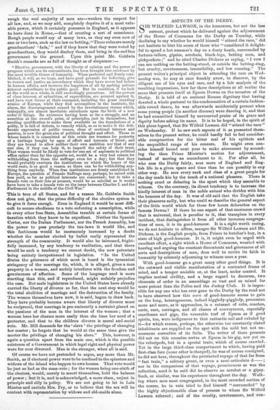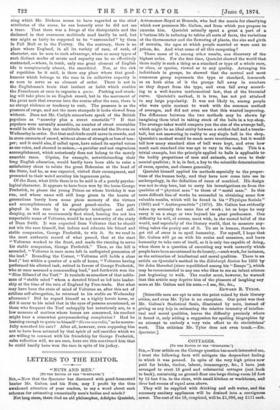ASPECTS OF THE DERBY.
SIR WILFRID LAWSON, in the humorous, but not the less earnest, protest which he delivered against the adjournment of the House of Commons for the Derby on Tuesday, while declining to say whether he would himself " attend the race," did not hesitate to hint his scorn of those who " considered it delight- ful to spend a hot summer's day on a dusty heath, surrounded by fortune-tellers, gipsies, acrobats, black-legs, betting men, and pickpockets ;" and he cited Charles Dickens as saying, " I vow I can see nothing on the betting-stand, or outside the betting-ring, but cruelty, covetousness, insensibility, and low cunning." The present writer's principal object in attending the race on Wed- nesday was, he may at once frankly avow, to discover, by the diligent use of his eyes and ears, and by a fair analysis of the resulting impressions, how far these descriptions at all realise the scene that presents itself at Epsom Downs on the occasion of the Derby. It is told of an eminent Roman dignitary that having devoted a whole pastoral to the condemnation of a certain fashion- able round dance, he was afterwards accidentally present when some young people (in another diocese) were dancing it, and that he had committed himself by unreserved praise of its grace and dignity before asking its name. It is to be hoped, in the spirit of this pious legend, that Sir Wilfrid Lawson did "attend the race" on Wednesday. If he saw such aspects of it as presented them- selves to the present writer, he could hardly fail to feel consider- able compunction for the bitter zeal of his epithets and the unqualified range of his censure. He might even con- sider himself bound next year to make atonement by second- ing the then Prime Minister's motion for adjournment, instead of moving an amendment to it. For after all, he who sees the Derby fairly, sees more of England and Eng- lish life in a given space and time than he can possibly in any other way. He sees every rank and class of a great people for the day made kin by the touch of a national pleasure. There is nothing cruel or debasing in the sport which they assemble to witness. On the contrary, its direct tendency is to increase the kindly interest of man in the noble animal who divides with him the honours of the day. It was of old said that the English take their pleasures sadly, but who could so describe the general aspect of the little world which for these few hours debouches on the famous Downs? If there be one aspect of that enormous crowd that is universal, that is peculiar to it, that transpires in every incident, that distinguishes it from all other immense congrega- tions of men, it is its good-humour. It is a sight worth seeing, we do not hesitate to affirm, maugre Sir Wilfrid Lawson and Mr. Dickens, is the English people, from Prince to butcher's boy, in a state of high good-humour. It is, it might even be urged with excellent effect, a sight which a House of Commons, wearied with hearing and arguing the constant discontents and grievances of all sorts and descriptions of men, does well to revive its faith in humanity by solemnly adjourning to witness once a year.
With good-humour go a great many other good things. It is the outward and visible manifestation of a contented frame of mind, and a temper amiable or, at the least, under control. It implies mutual civility, and a large regard to decorum, two elements of order in an assemblage so vast and so mixed far more potent than the Police and the Jockey Club. It is impos- sible for any one who has ever gone to the Derby by the road not to have observed how this aura of good-humour seems to gain on the long, heterogeneous, indeed higgledy-piggledy, procession more and more, as it approaches, in a cataract of cabs, coaches, carts, cars, carriages, and all classes of conveyances, especially omnibuses and gigs, the venerable turf of Epsom as if good spirits, too, were indigenous to that cathartic soil and exhaled by it—for which reason, perhaps, the otherwise too constantly elated inhabitants are supplied on the spot with the mild but not un- nauseous corrective of its Salts. The writer of these presents did not on this occasion arrive at Epsom in his gig, nor yet on the velocipede, but in a special train, which of course crawled. Yet in the large third-class compartment to which, having paid first-class fare (none other is charged), he was of course consigned, he did not hear, throughout the protracted voyage of that far from " fast train," a solitary grunt, or even a semi-articulate d—; nor in the companions of that voyage, promiscuous as was the collection, need it be said did be observe an acrobat or a gipsy. Such, or similar, was his experience throughout the day. Walk- ing where men most congregated, in the most crowded section of the course, he in vain tried to find himself " surrounded" by the highly objectionable class of persons to whom Sir Wilfrid Lawson referred ; and of the cruelty, covetousness, and cun-
ning which Mr. Dickens seems to have regarded as the chief attributes of the scene, be can honestly aver he did not see a trace. That there was a fringe of the disreputable and the
declassed in that enormous multitude need hardly be said, but one might as fairly be supposed to be " surrounded " by them in Pall Mall or in the Poultry. On the contrary, there is no place where England, in all its variety, of race, of rank, of character, can be seen to such advantage, where so many types of such distinct modes of estate and capacity can be so effectively contrasted,—where, in truth, only one great element of English life is conspicuously absent, the sacerdotal. Nor, at the risk of repetition be it said, is there any place where that good- humour which belongs to the race in its collective capacity is BO seen to serve as an element of order. There is not in the Englishman's brain that instinct or habit which enables the Frenchman at once to organise a queue. Pushing and crush- ing will take place in an English crowd, but in the movement of the great mob that swarms into the course after the race, there is no abrupt violence or tendency to rush. The pressure is as the pressure of surge, and not the mere stampede it looks viewed from without. Does not Mr. Carlyle somewhere speak of the British populace as "anarchy plus a street constable "? If that populace were naturally anarchic, no number of street constables would be able to keep the multitude that crowded the Downs on Wednesday in order. But that multitude could move in crowds, and in cross-currents of crowd, without abuse of strength or loss of tem- per; and it could also, if called upon, have raised its myriad voices as one voice, and cheered in unison,—a peculiar and not ungracious accomplishment, which notoriously does not belong to the merely anarchic races. Gipsies, for example, notwithstanding their long English education, would hardly have been able to raise a satisfactory cheer to salute the great Bohemian at the head of the State, had he, as was expected, visited their encampment, and presented to their weird scrutiny his ingenuous palm.
Of the Race, what little there is to be said is of a purely psycho- logical character. It appears to have been won by the horse George Frederick, to please the young Prince on whose birthday it was run, and whose name will still keep green in the hearts of generations barely born some pious memory of the virtues and accomplishments of his great grand-uncles. The part played in the race by a singularly intelligent and self- denying, as well as uncommonly fleet steed, bearing the not less respectable name of Volturno, would be not unworthy of the study of Dean Swift. It was expected from Volturno that he should not win the race himself, but induce and educate his friend and stable companion, George Frederick, to win it. So we read in the most authentic record of what passed, that at the start "Volturno worked to the front, and made the running to serve his stable companion, George Frederick." Then, as the hill is ascended, " Volturno is once more left in undisputed possession of the lead." Rounding the Corner, " Volturno still holds a clear lead ;" but within a quarter of a mile of home, "Volturno having performed his allotted task, retired in favour of George Frederick, who at once assumed a commanding lead," and forthwith won the "Blue Riband of the Turf." It reminds us somehow of that noble- man of " stable mind " whom a devoted friend so led into leader- ship at the time of the rain of England by Free-trade. But what may have been the state of mind of Volturno as, after this act of sublime self-abnegation, he returned to his stable on Wednesday afternoon ? Did he regard himself as a highly heroic horse, or did it occur to his mind that in the eyes of persons accustomed, as those who frequent the Turf unhappily but notoriously are, to a low measure of motives where horses are concerned, his conduct might bear a somewhat gerrymandering complexion ? Had he learning enough to quote to himself "Sicroos nonvobis," as he mourn- fully munched his oats? After all, however, even supposing him not to have been actuated by that spirit of self-sacrifice which we are willing to connect with his friendship for George Frederick, calm reflection will, we are sure, have ere this convinced him that be could hardly have won the race in spite of his jockey.



































 Previous page
Previous page